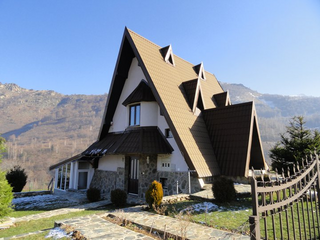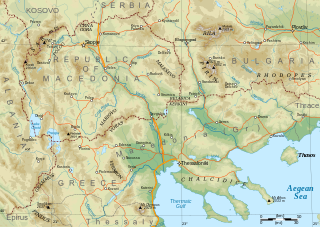
Slavs are an Indo-European ethnolinguistic group group who speak the various Slavic languages of the larger Balto-Slavic linguistic group. They are native to Eurasia, stretching from Central, Eastern, and Southeastern Europe all the way north and eastwards to Northeast Europe, Northern Asia (Siberia), and Central Asia, as well as historically in Western Europe and Western Asia. From the early 6th century they spread to inhabit the majority of Central, Eastern and Southeastern Europe. Today, there is a large Slavic diaspora throughout North America, particularly in the United States and Canada as a result of immigration.
Aegean Macedonia is a term describing the modern Greek region of Macedonia in Northern Greece. It is currently mainly used in the Republic of North Macedonia, including in the irredentist context of a United Macedonia. The term is also used in Bulgaria as the more common synonym for Greek Macedonia, without the connotations it has in the Republic of North Macedonia. The term has no circulation in Greece, since Aegean usually refers to the Greek islands or to strictly Greek coastal areas with direct access to the Aegean Sea. Although Greek Macedonia does indeed have its coastline along the northern Aegean, the province is more than anything else dominated by its high mountain ranges and broad, grassy plains, rather than by its coastline.
Macedonians or Macedonian people are a nation and a South Slavic ethnic group native to the region of Macedonia. They speak the Macedonian language, a South Slavic language. About two thirds of all ethnic Macedonians live in North Macedonia and there are also communities in a number of other countries.

The Greek diaspora, Hellenic diaspora or Omogenia refers to the communities of Greek people living outside Greece, Cyprus which are the traditional Greek homelands, Albania, North Macedonia, parts of the Balkans, southern Russia, Ukraine, Asia Minor, the region of Pontus, Eastern Anatolia, Georgia, the South Caucasus, Egypt, southern Italy and Cargèse in Corsica. The term also refers to communities newly established by Greek migration outside these traditional areas during the 20th and 21st centuries.

Macedonia is a geographic and administrative region of Greece, in the southern Balkans. Macedonia is the largest and second-most-populous Greek region, with a population of 2.38 million in 2017. The region is highly mountainous, with most major urban centres such as Thessaloniki and Kavala being concentrated on its southern coastline. Together with Thrace, and sometimes also Thessaly and Epirus, it is part of Northern Greece. Greek Macedonia encompasses entirely the southern part of the region of Macedonia, making up 51% of the total area of the region. It also contains Mount Athos, an autonomous monastic region of Greece. Macedonia forms part of Greece's national frontier with three countries: Bulgaria to the northeast, North Macedonia to the north, and Albania to the northwest.
Macedonian Australians are Australians of ethnic Macedonian descent. Many arrived in the 1920s and 1930s, although larger numbers came to Australia after World War II and the Greek Civil War. By far the largest wave of immigration was during the 1960s and 1970s.

The name Macedonia is used in a number of competing or overlapping meanings to describe geographical, political and historical areas, languages and peoples in a part of south-eastern Europe. It has been a major source of political controversy since the early 20th century. The situation is complicated because different ethnic groups use different terminology for the same entity, or the same terminology for different entities, with different political connotations.

Macedonian nationalism is a general grouping of nationalist ideas and concepts among ethnic Macedonians that were first formed in the late 19th century among separatists seeking the autonomy of the region of Macedonia from the Ottoman Empire. The idea evolved during the early 20th century alongside the first expressions of ethnic nationalism among the Slavs of Macedonia. The separate Macedonian nation gained recognition after World War II when the "Socialist Republic of Macedonia" was created as part of Yugoslavia. Afterwards the Macedonian historiography has established historical links between the ethnic Macedonians and events and figures from the Middle Ages up to the 20th century. Following the independence of the Republic of Macedonia in the late 20th century, issues of Macedonian national identity have become contested by the country's neighbours, as some adherents to aggressive Macedonian nationalism, called Macedonism, hold more extreme beliefs such as an unbroken continuity between ancient Macedonians, and modern ethnic Macedonians, and views connected to the irredentist concept of a United Macedonia, which involves territorial claims on a large portion of Greece, along with smaller regions of Albania, Bulgaria, and Serbia.

The official language of Greece is Greek, spoken by 99% of the population. In addition, a number of non-official, minority languages and some Greek dialects are spoken as well. The most common foreign languages learned by Greeks are English, German, French and Italian.
Slavic-speakers are a linguistic minority population in the northern Greek region of Macedonia, who are mostly concentrated in certain parts of the peripheries of West and Central Macedonia, adjacent to the territory of the Republic of North Macedonia. The language called "Slavic" in the context of Greece is generally called "Macedonian" or "Macedonian Slavic" otherwise. Some members have formed their own emigrant communities in neighbouring countries, as well as further abroad.
The ethnic groups in the Middle East refers to the peoples that reside in West Asia and Egypt in North Africa. The region has historically been a crossroad of different cultures. Since the 1960s, the changes in political and economic factors have significantly altered the ethnic composition of groups in the region. While some ethnic have been present in the region for millennia, others have arrived fairly recently through immigration. The five largest ethnic groups in the region are Arabs, Azerbaijanis, Kurds, Persians, and Turks but there are dozens of other ethnic groups which have hundreds of thousands, if not millions, of members.

The Macedonian community of Brazil refers to the group of ethnic Macedonians living in Brazil or their descendants.
The Macedonians or Greek Macedonians are a regional and historical population group of ethnic Greeks, inhabiting or originating mainly from the Greek region of Macedonia, in Northern Greece, which incorporates most of the territories of the ancient Kingdom of Macedonia. Today, most Macedonians live in or around the regional capital city of Thessaloniki and other cities and towns in Greek Macedonia, while many have spread across Greece and in the diaspora. Notably, they have a heritage and identity distinct from that of the Slavic Macedonians, who mainly inhabit the Republic of North Macedonia, which roughly corresponds to the ancient Kingdom of Paeonia.
Montenegrins refers to South Slavic people associated with Montenegro.

Nižepole is a village in the municipality of Bitola, Republic of Macedonia and is an alpine settlement 7.85 kilometers from Bitola.
The Albanians in the Nordic countries are people of Albanian ancestry and heritage in such Nordic countries as Denmark, Faroe Islands, Finland, Norway and Sweden. They trace their ancestry to the territories with a large Albanian population in the Balkans among others to Albania, Kosovo, Macedonia and Montenegro. They are adherents of different religions and are predominantly Christians, Jews, Muslims as well as Irreligious.
Macedonian Slavs may refer to:








